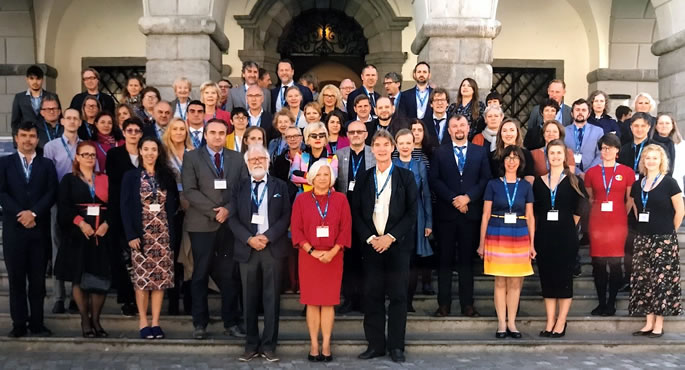Summary of EMA-PASCAL Meeting: In recognition of museums development
From 19-21 September colleagues from 20 countries across Europe gathered in Ljubljana to celebrate the European Museum Academy (EMA) annual awards ceremony and conference (2019), which included talks by celebrated winners of the prestigious awards for best practice. Twenty-six museums were nominated this year, and the winner of the Micheletti award for work of excellence in social and industrial history was the Astra Museum complex in Transylvania, Romania - first time ever a winner from that country. The winner of the DASA award for excellent work in learning and education in museums was the Workers Museum in Copenhagen, Denmark.
 Attendees at the European Museum Academy (EMA) annual awards ceremony and conference (2019)
Attendees at the European Museum Academy (EMA) annual awards ceremony and conference (2019)
The conference included a workshop arranged by European Museum Academy and PASCAL regarding plans for a European Master Program in Museum Education and Studies, led by Dr Maggie Jago, University of Glasgow and Dr Henrik Zipsane, European Museum Academy. 11 colleagues discussed the need for a common European approach and the potential of such a master education. Among other things, the need for sustainability in museums' work today creates demands for new competencies and business ideas. The growth in museum numbers and amount of guests and users illustrates a need and a public demand.
The challenge for museums in many countries today also includes overcoming often political barriers for freedom of expression. “It takes courage to tell and show the truth in museums” was expressed by a number of colleagues. This meeting offered the third opportunity for PASCAL-EMA to gather and move forward their joint Special Interest Group (SIG) in Cultural Heritage and Cultural Literacy for Inclusive Societies.
Following on from an initial scoping meeting in Aarhus (2017), and a collaborative workshop in Östersund (at Jamtli 2018), the PASCAL SIG is now open for membership. The group, comprising existing PASCAL International Observatory members with interests in this area, have reified their aims as fourfold- 1) Collaborative knowledge exchange, 2) Educational collaborations, 3) Research partnerships and 4) Policy development:
- To meet annually as a PASCAL-EMA collaborative team to further work on inclusive practices in cultural heritage, cultural policy, and cultural literacy practices. Such spaces allow knowledge exchange across and beyond European partners and engage diverse stakeholders from cultural organisations to local government and educational institutions.
- To further educational partnerships between PASCAL members and EMA organisations, as such meetings offer the opportunity to consider how PASCAL SIGs might contribute to the exchange of research, skills, and training and develop new educational networks. For example, this recent meeting offered space for further develop links and educational exchange in relation to the development of the Erasmus Mundus Masters bid, led by Glasgow University with close EMA collaboration.
- To develop new research partnerships between PASCAL and EMA members and their organisations, such as a number of Horizon2020 bids which have been developed through such collaborations. PhD ad MSc exchanges also offer fruitful opportunities for capacity building and knowledge exchange.
- Policy Development is the ultimate goal of the PASCAL-EMA partnership, as it is hoped that the annual meetings, educational and research partnership brokered will lead themselves to the development of new inclusive policies in the areas of cultural heritage and cultural literacy for all, particularly in an increasingly digital world.
Our pressing need is for expressions of interest to join our SIG from existing members of both PASCAL and EMA, and other interested parties. Our second need is to ensure that the interesting work we are doing across countries is clearly communicated via the PASCAL International Observatory website. Our third need is for increased PASCAL-EMA organisational collaboration in the four areas above.
For instance, PASCAL, working in cooperation with the European Museums Academy (EMA), is set to make an input into a new project known as SOPHIA which is focusing on heritage and its impact on society. The project will look at issues around high-quality interventions in the field of cultural heritage and cultural landscapes and how they can contribute to local communities’ well-being and to the development of sustainable cultural tourism. Additional outlets of communication must also be maximised, including knowledge exchange through the EMA monthly newsletter and university web pages, which is why we have accessed an intern to support the dissemination of our work.
It has emerged from prior meetings that the field of cultural heritage, that cultural policy, and cultural practice is in need of interdisciplinary, multi-stakeholder spaces, which are participatory in nature, and allow for much needed multicultural and cross-cultural engagement. It is only through developing such a diverse community of practice that we may engage in more open dialogue, and truly hear the voices of both local cultural practitioners but also national governmental stakeholders.
If you are interested in joining us on this journey, please send a brief bio and statement of interests as regards the four priorities above to [email protected] with the title "PASCAL SIG".
Authors: Catherine Lido & Henrik Zipsane, with contributions from Maggie Jago and Rob Mark
 Printer-friendly version
Printer-friendly version- Login to post comments







